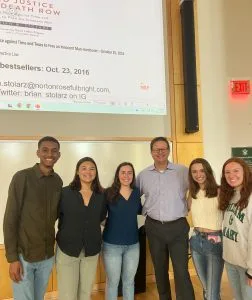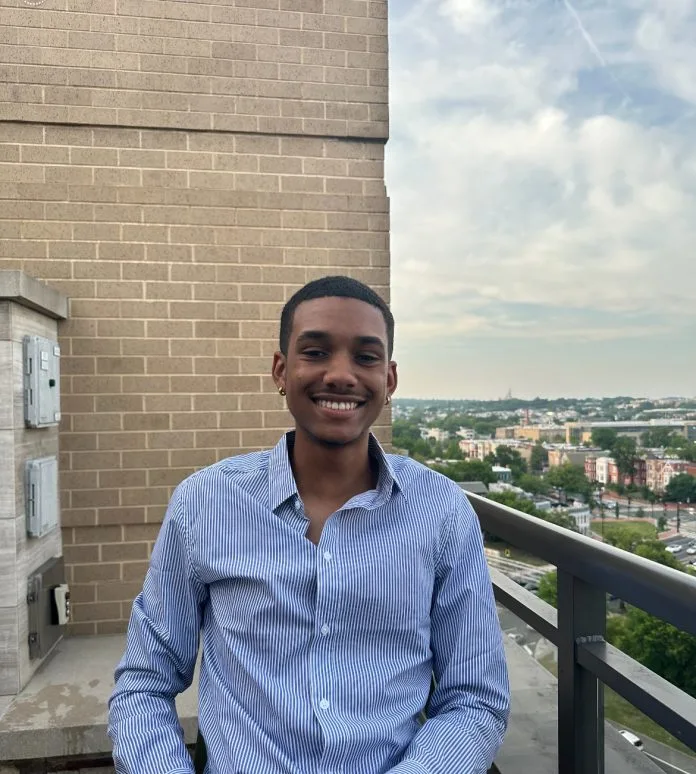Jonathan Wilkins ’24 has established himself as an active member of the College of William and Mary’s civil rights scene, an accomplished scholarship recipient and a future teacher. As a double majoring in history and government, Wilkins has pursued multiple interests before deciding on the areas he is passionate about.
“The more I explored what I really wanted to pursue, I realized I’ve always been interested in social justice issues,” Wilkins said. “I realized that studying history and government was sort of building the context in order to be able to understand and better interact with that topic.”
Wilkins is involved with multiple civil rights organizations at the College, one of the most impactful for him being the Innocence Club. This group is dedicated to providing education and advocacy on criminal justice issues, specifically wrongful convictions. As Vice President of Programming for the club, Wilkins coordinates with speakers and manages the group’s schedule. The club has brought in speakers including attorneys and those who have been wrongfully convicted.
“To me, participating in a sense gives me a way to do advocacy work in teaching, but also educating myself and just interacting with the issues and making sure that stories of people who have been impacted by the criminal justice system doesn’t go unheard,” Wilkins said.

Wilkins is also heavily involved in Merrimac Mentors, a group that goes to the Merrimac Juvenile Detention Center in Williamsburg and works with residents. As a small, tight-knit group, members plan activities for their weekly visits such as letter and poetry writing. Getting to know the residents and witnessing their excitement for the mentors to return every week has been rewarding for Wilkins.
In the same realm of civil rights activism, Wilkins was able to attend the Leadership Conference on Civil and Human Rights in Washington, D.C. this past summer. Wilkins was involved with the coalition through the College’s D.C. Summer Institute Program, which integrated the internship with various classes.
“I met a lot of people who have been doing civil rights work for the past 40 years plus, so people who are really experienced and well known within the civil rights space,” Wilkins said. “I learned a lot about Congress and how to lobby and how to promote legislation and how to be a better activist. I feel so much better for it, and I really appreciate the experience.”
Wilkins feels his curiosity has been a defining characteristic guiding his various achievements.
“I’m very comfortable, but I also really enjoy when I don’t know something because it inspires me to dig deeper into that and to better understand it,” Wilkins said. “I spend a lot of time on Wikipedia spirals where I click on something like ‘what is that?’ and I click on it and go to the next thing. It’s really nice to embrace the unknown and not be afraid of not knowing something, but sort of capitalize on that and dig deeper into it.”
Along with clubs and activities, Wilkins is both a Monroe Scholar and a William and Mary Scholars Undergraduate Research Experience participant. Admitted to the College as a Monroe Scholar due to academic merit, Wilkins was able to do research over the summer of his freshman year. He worked alongside a law professor and studied the differences in the treatment of Black and white juveniles in the criminal justice system. Wilkins recently transitioned to writing an honors thesis in the government department, made possible by the Monroe Scholars program funding.
The WMSURE program provided Wilkins with more opportunities to conduct research.
“I remember going into the meetings every week on Zoom and talking to other students and just seeing more students that looked like me. That was kind of the only place where I saw other students who looked like me and had similar backgrounds and we were able to talk and just share our experiences,” Wilkins said.
“I remember going into the meetings every week on Zoom and talking to other students and just seeing more students that looked like me. That was kind of the only place where I saw other students who looked like me and had similar backgrounds and we were able to talk and just share our experiences,” Wilkins said.
Being a Black student at a predominantly white school has had both its ups and downs for Wilkins. During his freshman year, at the height of Black Lives Matter protests, Wilkins felt a strong sense of community and acceptance. However, to Wilkins, despite a mostly positive experience, the years following the heightened awareness period led to increased ignorance.
“It almost felt like this one thing that we all focused on, we kind of just forgot about it — that’s when I sort of realized that a lot of students here went to predominantly white high schools and come from predominantly white backgrounds in general,” Wilkins said. “I’ve had a lot of conversations with people where it’s been insensitive towards students of color.”
After graduation, Wilkins has a middle school teaching job lined up through Teach for America, which places newly graduated students at schools with generally low income students. Fueled by his love of teaching and advocacy, Wilkins will be an English teacher, attempting to bolster reading and writing skills in kids that were hindered by the COVID-19 pandemic.
In terms of role models, Wilkins has had numerous teachers that have inspired him and guided him on his journey throughout college. His thesis advisor, Assistant Professor of government Mackenzie Israel-Trummel, is someone he looks up to as a dedicated teacher. Assistant Director of the College’s National Institute of American History and Democracy program Robyn Schroeder has provided him with a model of teaching centered around student wellbeing and success that he hopes to emulate in his future job.
The classes that have been the most influential for Wilkins coincide with his passion for civil rights. Wilkins mentioned a class he is currently taking taught by Associate Professor of government and Director of the Center for the Liberal Arts Christine Nemacheck.
“I’m taking this class right now called Politics of Criminal Justice with Professor Nemacheck, which is my 400 in the gov. department and it’s a really insightful class,” Wilkins said. “I’m very interested in criminal justice related issues, so I learn about the current state of the courts and prosecution and policing and all these things that impact everyone, whether you’re inside the criminal justice system or not.”
His college years have been a period of growth for Wilkins. Overcoming periods of struggling to find his place, Wilkins has made a name for himself and is happy with what he has accomplished.
“It wasn’t until sometime during my junior year where I actually felt like, okay, I belong here, I think part of that might be because being a minority, it’s easier to stick out,” Wilkins said. “I found my group of people and that really helped me solidify a place at William and Mary. Long story short, I have come a long way and I’m very satisfied with where I’m at now.”




